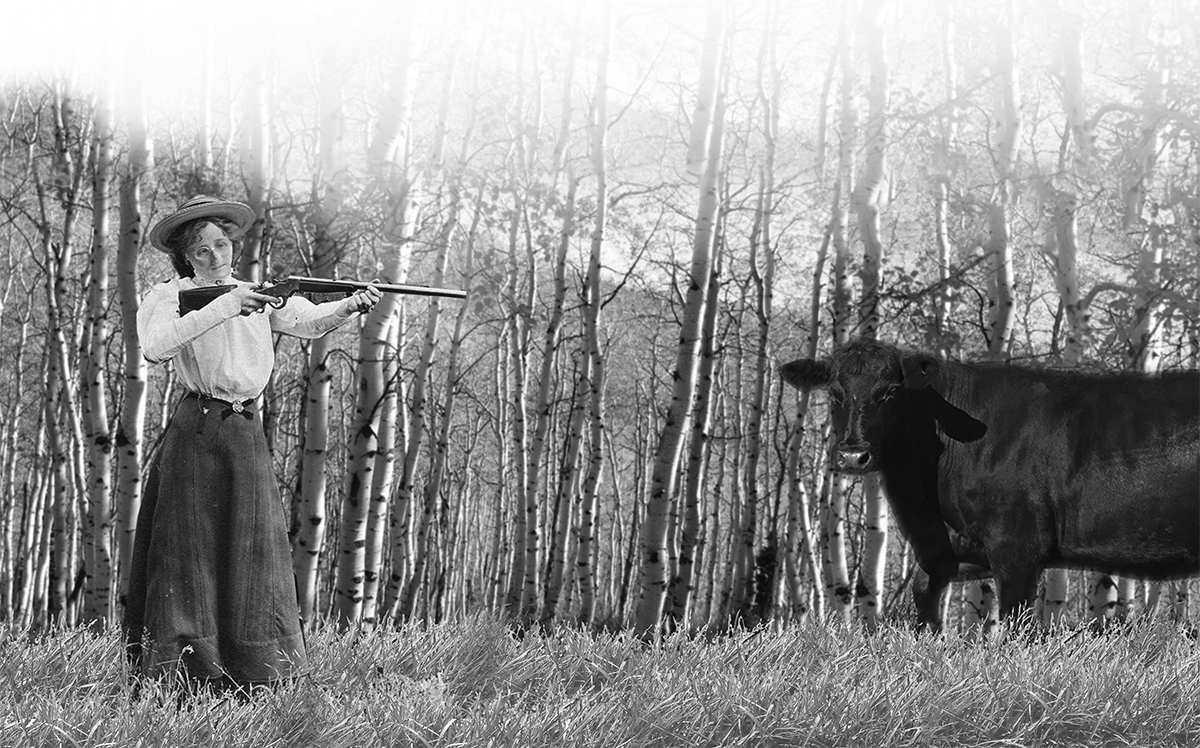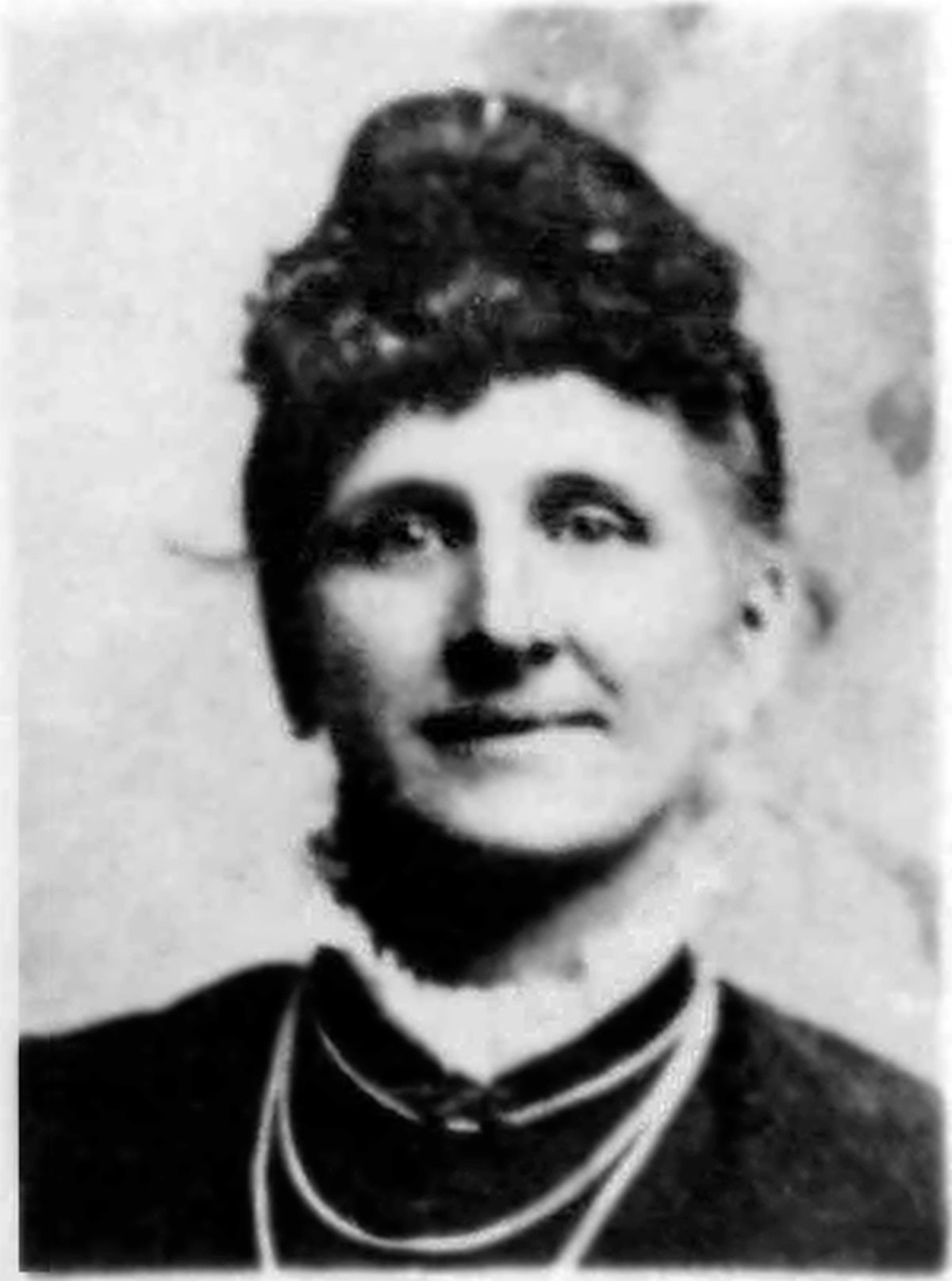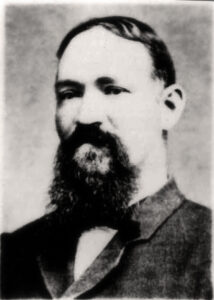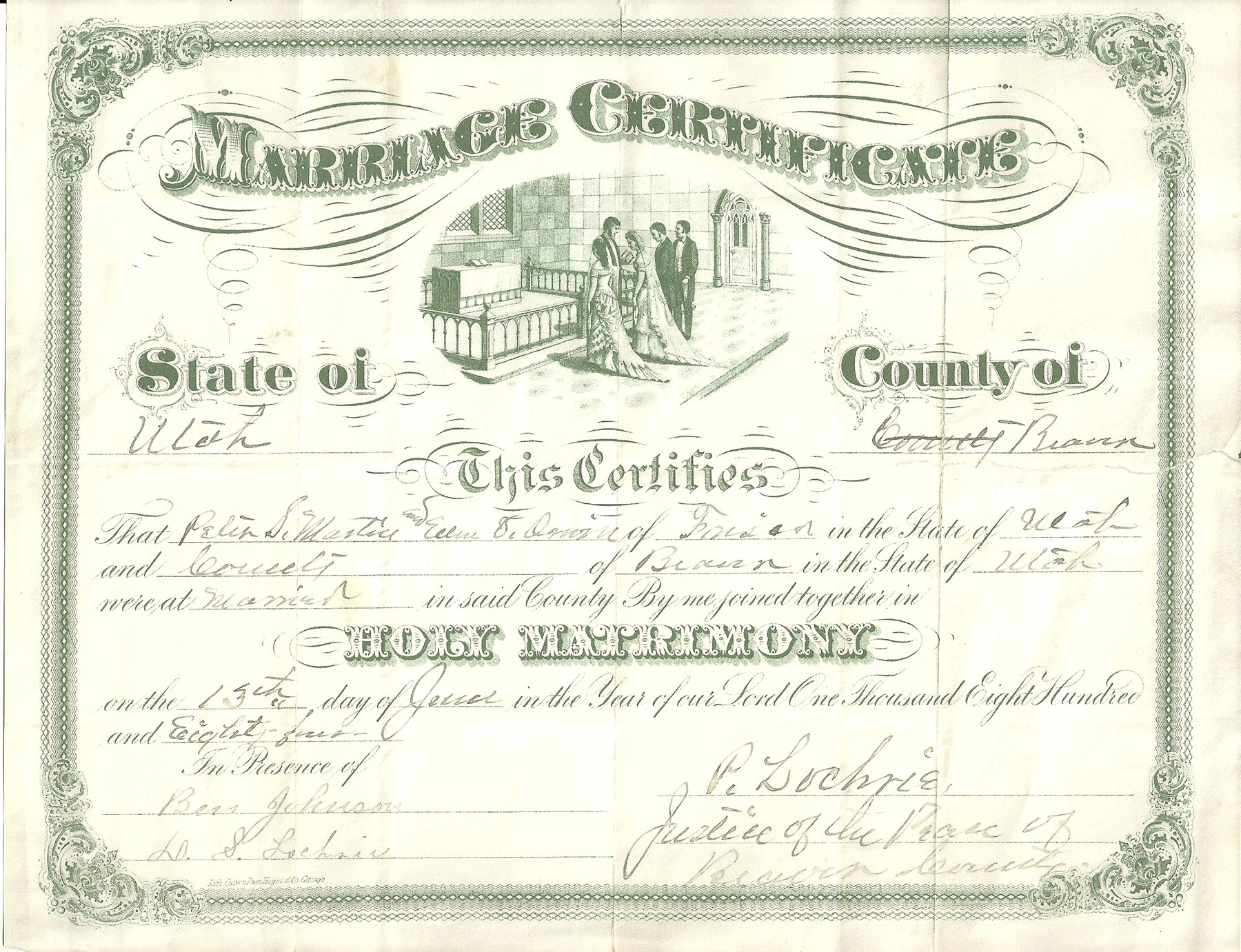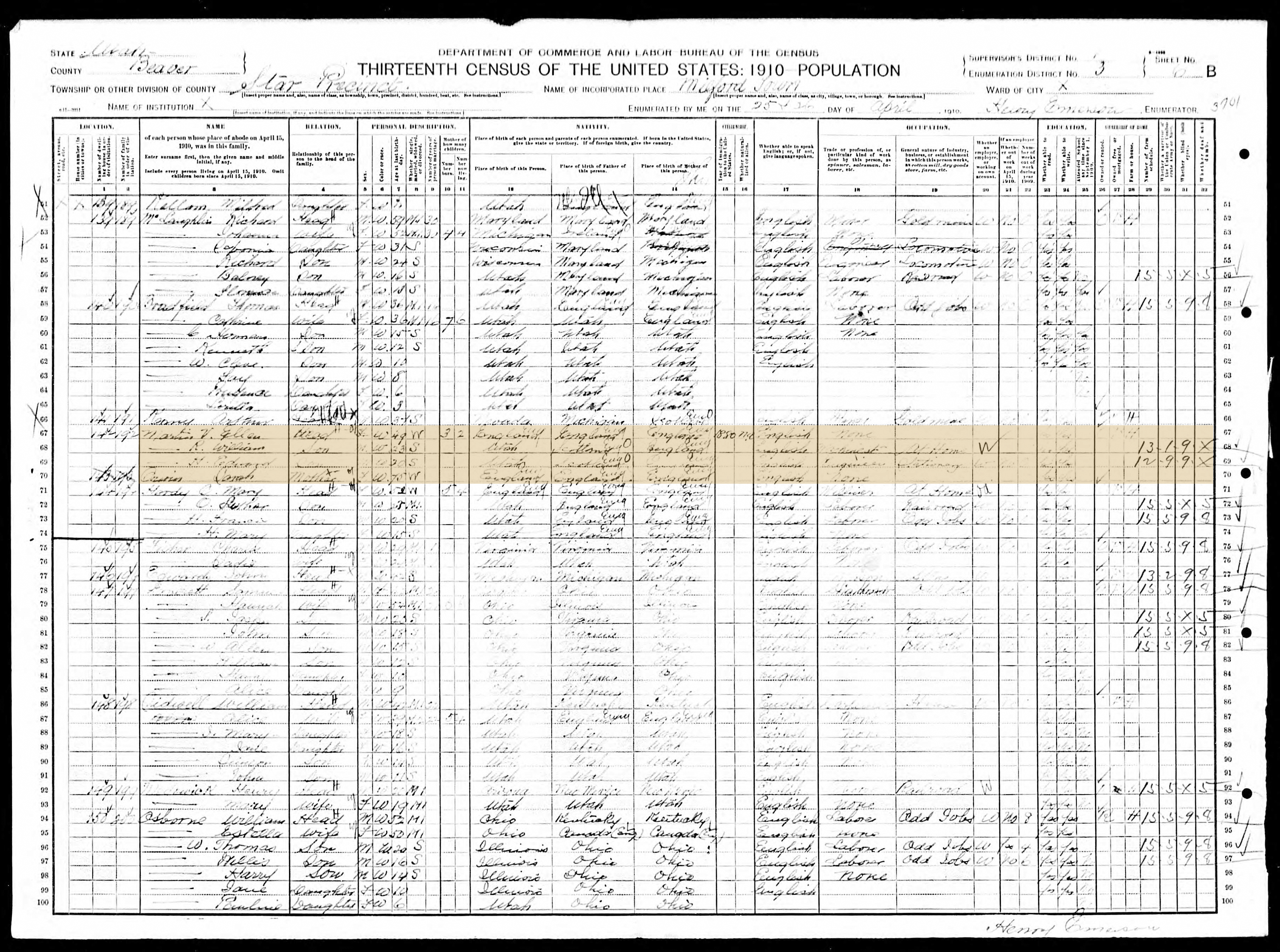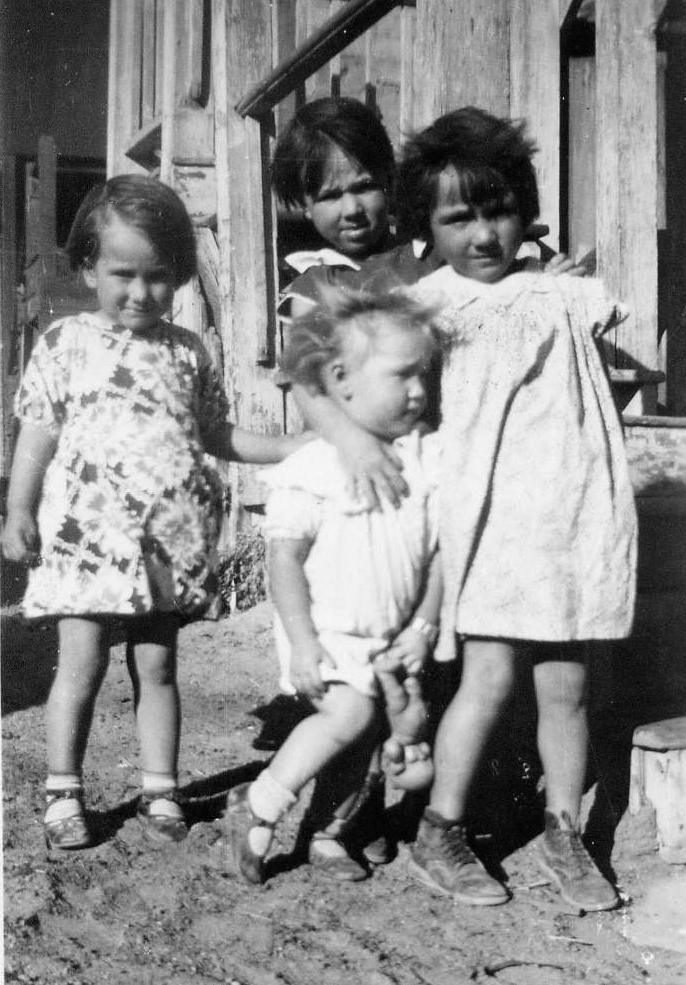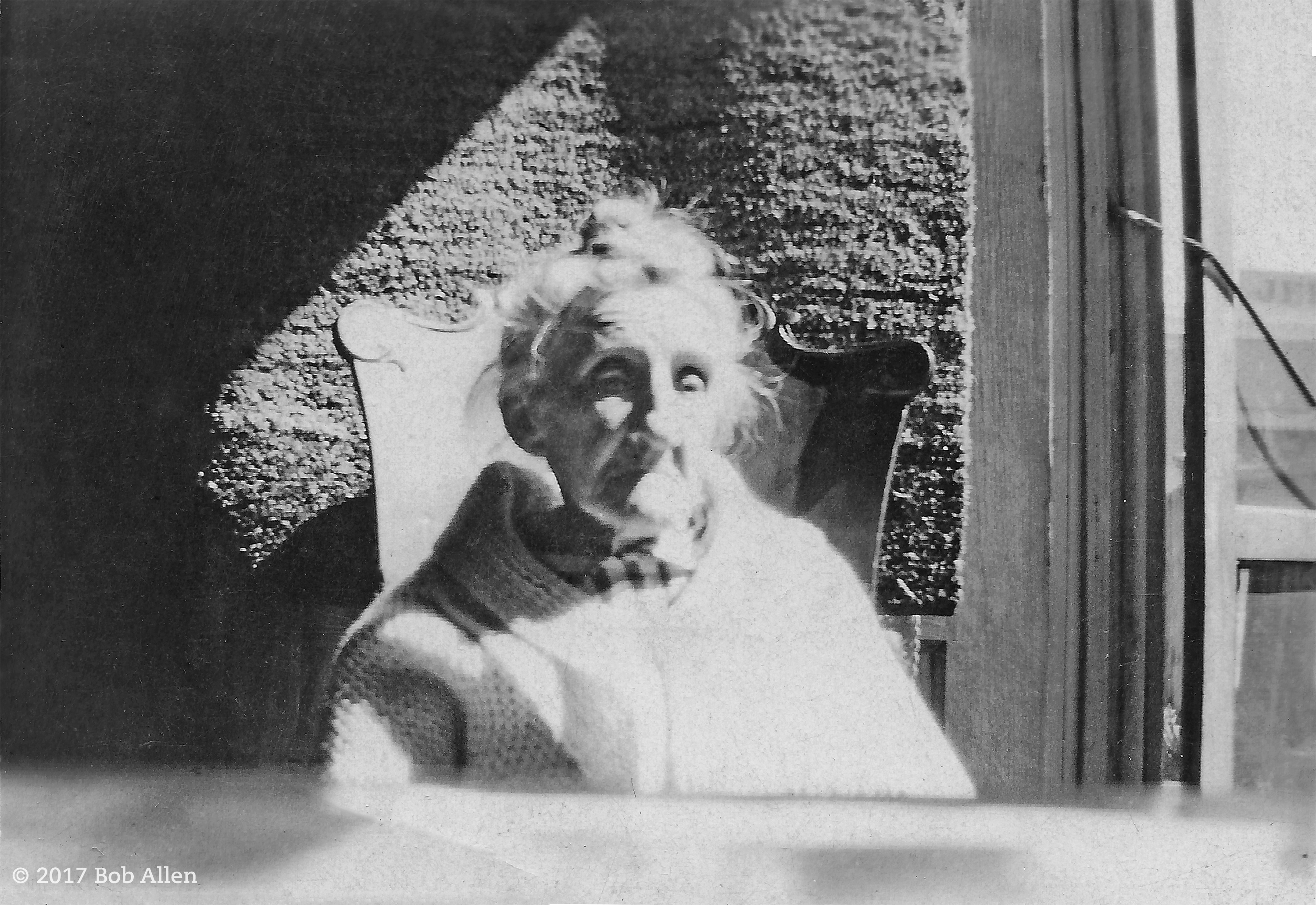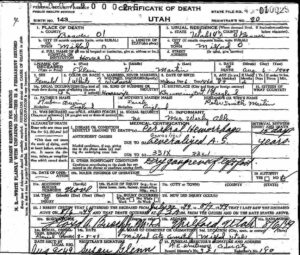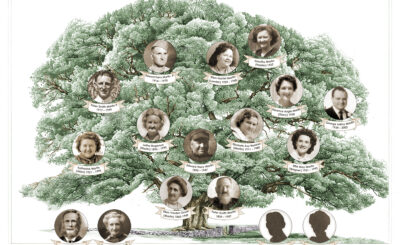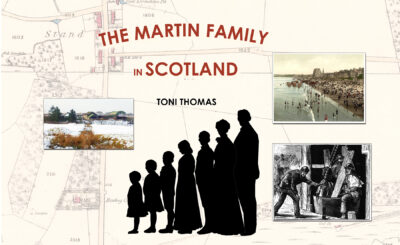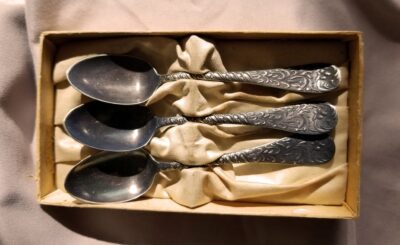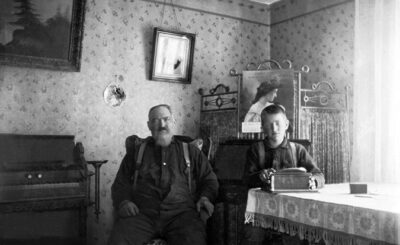Ellen was born in Birmingham, England, in 1860 to Sarah Swindoll and Joseph Varden. After her father died, Sarah remarried Ruben Orwin, and Ellen took the Orwin name until she married. She and her little brother, Levi Orwin emigrated to America together and went directly to Frisco (Beaver County, Utah) to join her father who had preceded them there. Later her mother and five sisters joined them. She worked for Dr. Christian’s family for awhile until her marriage to Peter S. Martin.1
Ellen and Peter were married on June 13, 1884 by the Justice of the Peace of Beaver County. Shortly thereafter, she and Peter move to the Martin Ranch, a 468-acre spread along the Beaver River two and a half miles south of Milford at Horseshoe Bend. Milford. The ranch was “all under fence and partitioned for pastures. They raised … hay, horses, cows, geese, etc.”
“Ellen says she worked very hard often having to do the work of a man, because Peter had to be at the mines over-seeing the men he had working for him.
“Food had to be produced on the ranch to feed the men at the mines. Ellen says she always raised a nice garden. She sent them vegetables from her garden. She also made butter and there was meat and poultry and eggs.
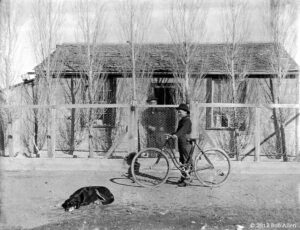
“Ellen said: ‘those were happy days , I loved the ranch and wish we had never sold it. Those were happy days even though the work was hard.’ ”2
Their first child, Peter Smith Martin, Jr., was born there on March 15, 1885. Ellen delivered the child herself, as Peter had gone to get a doctor, by some accounts, or to get her mother, as Ellen tells it. “Peter had left her alone to go Frisco after her mother who had arranged to care for her and while he was gone the baby came. Ellen cut the cord and cleaned herself the child before they got back. Her mother stayed awhile to care for her and the baby and they both got on splendidly. Ellen says she had read about how to care for herself in such an emergency.” 3
Sadly the child died in August a few months later. According to Ellen’s granddaughter, Dorothy Holder, Ellen kept a photo of the child on the wall of her bedroom all of her life.
Three other children were born to Peter and Ellen and delivered by midwife: William Ruben in 1886, Edward Harry Martin in 1890, and a stillborn child. All of Ellen’s children would precede her in death.
Ellen was “a woman of keen intelligence and refinement. She love[d] to read good books not novels and trashy literature.
Three rules she [said] govern[ed] her life: ‘never beg, never borrow, and never steal.’ ” 4
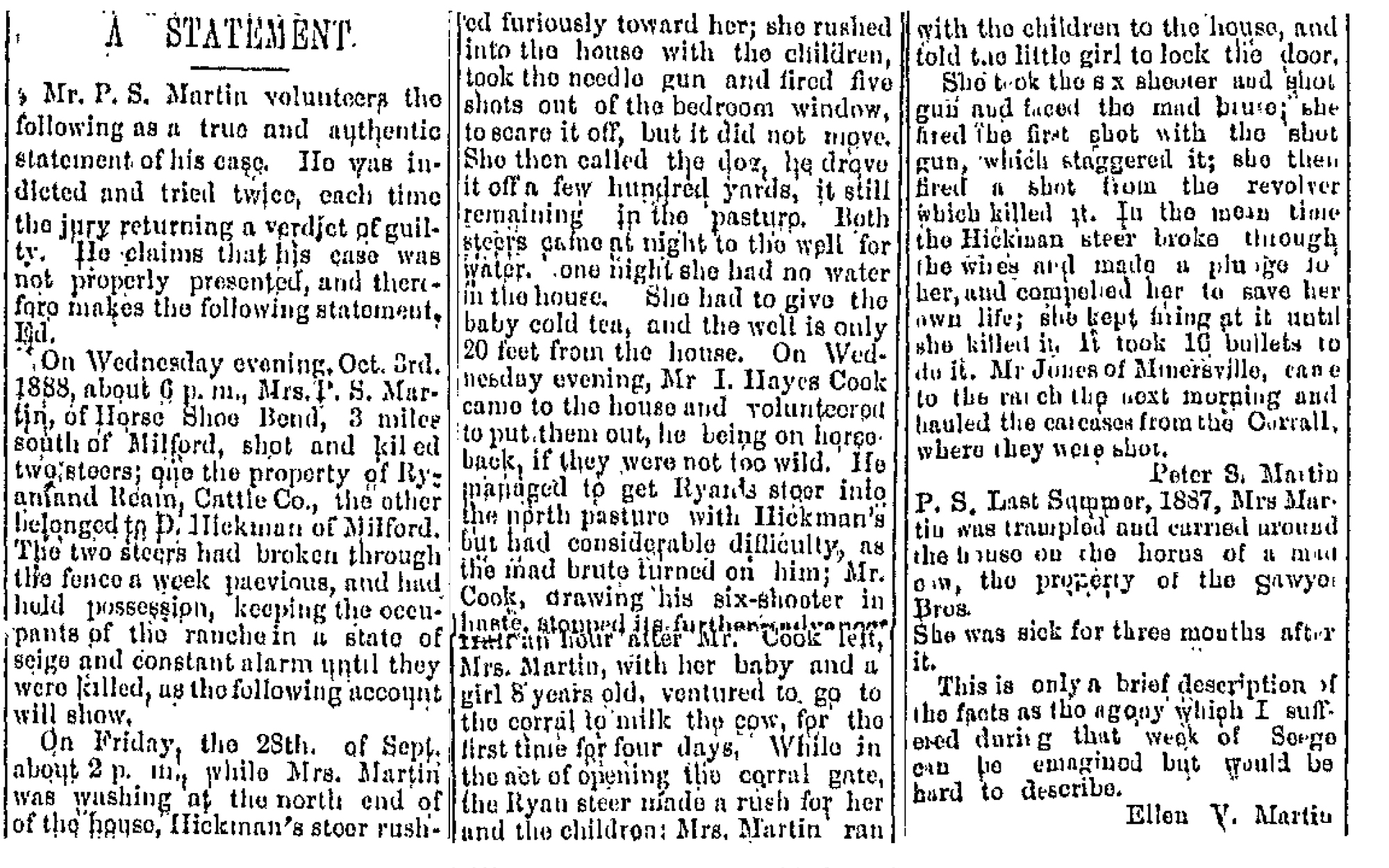
Peter, as a miner, was away much of the time prospecting or overseeing his claims in the mountains to the west or in Salt Lake City to conduct business and deliver ore. It was on one of these occasions that Ellen found herself in trouble with two steers. In the May 23, 1889 edition of the Southern Utonian newspaper, Peter Martin explains:
On Friday, the 28th of Sept. about 2 p.m., while Mrs. Martin was washing at the north end of the house, Hickman’s steer rushed furiously at her; she rushed into the house with the children, took the needle gun and fired five shots out of the bedroom window, to scare it off, but it did not move. She then called the dog, he drove it off a few hundred yards, it still remaining in the pasture. Both steers came at night to the well for water, one night she had no water in the house. She had to give the baby cold tea, and the well is only 20 feet from the house.
On Wednesday evening, Mr. I Hayes Cook came to the house and volunteered to put them out, he being on horseback, if they were not too wild. He managed to get Ryand’s steer into the north pasture with Hickman’s but had considerable difficulty, as the mad brute turned on him; Mr. Cook, drawing his six-shooter in haste, stopped its further advance. Half an hour after Mr. Cook left, Mrs. Martin, with her baby and a girl 8 years old, ventured to go to the corral to milk the cow for the first time in four days. While in the act of opening the corral gate, the Ryan steer made a rush for her and the children: Mrs. Martin ran with the children to the house, and told the little girl to lock the door.
She took the six-shooter and shotgun and faced the mad brute; she fired the first shot with the shotgun, which staggered it; she then fired a shot from the revolver which killed it. In the mean time the Hickman steer broke through the wires and made a plunge to her and compelled her to save her own life; she kept firing at it until she killed it. It took 10 bullets to do it.
In a postscript note to the newspaper article, Ellen Martin adds:
Last summer, 1887, Mrs. Martin was trampled and carried around the house on the horns of a mad cow, the property of the Sawyer Bros.
She was sick for three months after it.
This is only a brief description of the facts as the agony which I suffered during that week of Seige can be imagined but would be hard to describe.5
Peter died in 1907—1910 found Ellen and her two sons living in the town of Milford with her mother, Sarah Orwin, and next door to her sister, Mary Hardy, who also had been widowed.
Later, when she was nearly eighty, Ellen opened her home to her young grandchildren, Florence (7), Effie (6), and Dorothy (5) Martin. Florence and Dorothy remember her as a feisty lady, kind but firm with the active young girls.
“I remember Grandma’s hair was long, long,” Dorothy recalls. “She would comb her hair and then twist it around in a bun on top, and fasten it with a comb. She used to wear gunny sacks around her waist for aprons. People would give her clothes and aprons and she’d put them in a chest upstairs and said she was saving it for her wedding.“
Grandma Martin was about 5’2” and bent over with age when we knew her. When she was younger she had broken her hip or leg and set it herself. She didn’t believe in doctors. Consequently, one leg was shorter than the other and she walked with a limp. “She had a wooden chair that she took the back off and used it as a crutch to get around when she needed it,” Florence says.
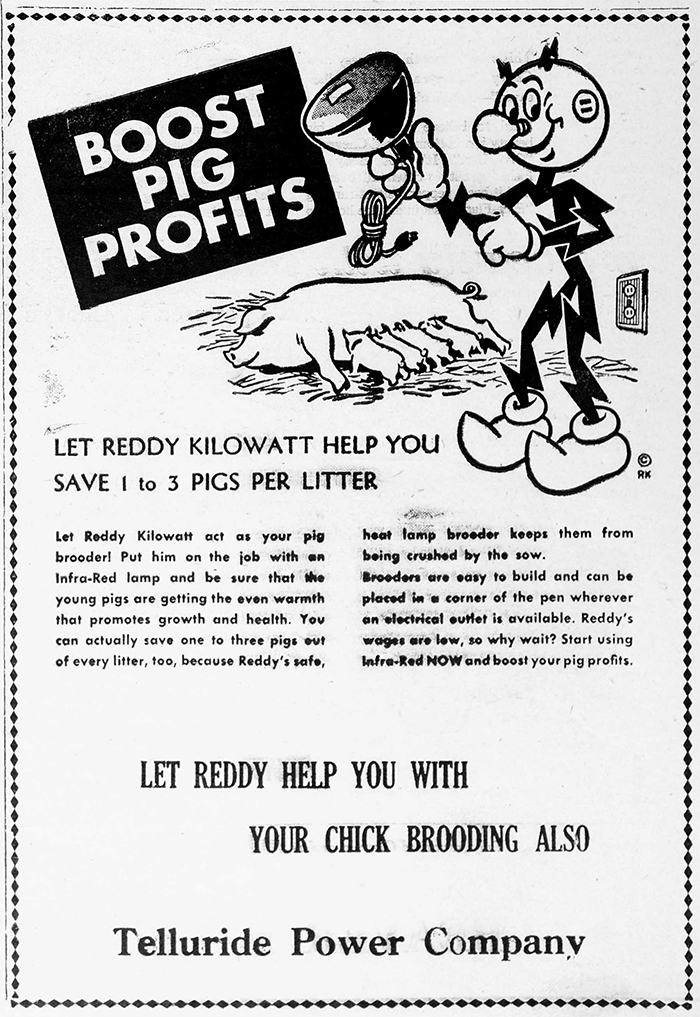
“Even though Grandma was quite elderly, she used to go once a week to clean the office of the Telluride Power Company. It was her little job. She would also raise chickens in a pen out back by the outhouse. “One day there was a hen sitting on a nest with baby chicks,” says Dorothy, “and Grandma brought the baby chicks in her gunny-sack apron and let us pet them. They were so soft!” Grandma grew roses along the side of the house and loved her roses.
“We used to sleep in the living room on a fold-up cot because there was no other place for us. We ran around in overalls and barefoot when we were younger because we couldn’t afford shoes. It must have been rough on Grandma Martin to live with poverty after having once been wealthy. She still had beautiful pictures of her ancestors in golden frames on her walls and a beautiful cuckoo clock from the German Black Forest. Grandma had beautiful trunks in the attic with nice clothes in it but most of the time she dressed like she never had any clothes. But Grandma was very patriotic and would dress up to vote. Come election day she’d get all dressed up in her old-fashioned clothes, a long, black dress with a bustle, button-up shoes that went almost to her knees, and a tall hat with a big feather,” Florence recalls.
Grandma used to drink a glass of red wine every morning. Dorothy remembers one day asking for a taste. “It was nastiest stuff I had ever tasted.” Having been raised in England, Grandma still spoke with an English accent and she loved her tea. We used to have a cup of tea every morning. Sometimes farmers would leave milk on the porch for us. The first one up got the cream! We would have that or canned milk in our tea.
Every day Aunt Zuma would call from her house next door, “Mrs. Martin, cup of tea?” Grandma would go over and have a cup of tea with her. Although Grandma cooked for us, she would usually go and take her own meals at Aunt Zuma’s house. While she was gone we used to sneak up to the attic and go through the treasures that were stored up there. There were trunks full of beautiful clothes, nightgowns with lace, and an old-fashioned camera that had the cloth the photographer put over his face.
Grandma Martin had a sister Mary Hardy who ran a hotel in Milford. We used to go and visit her, although all the kids in town claimed she was a witch. She would let us go up in the attic and play with the kittens that the mother cat had stashed there.
Grandma Martin was very frugal and had to be for we were very poor. Whenever we were picky or did not want to eat our food, she would say:
I must not waste one single crust for fear that I might say
Oh, how I wish I had that bread that once I threw away.
Every day for breakfast Grandma Martin made wheat germ mush, which we ate with milk and sometimes sugar. Often we would have the same thing fried for lunch. Grandma would cook eggs from the hens for Dad, and when she turned her back we would ask for bites. She had triple good hearing, and would hear us and say, ”Leave your father alone. Let him eat. You’d take the last bite out of your poor father’s mouth.“
One day Grandma gave Dad a large plate of eggs, more than he could eat, Dorothy recalls. “Mother, can I give these children some of these eggs.”
“Oh, yes, I made enough for all of you,“ she answered. There were enough eggs for everyone but had forgotten to tell him to share!
Grandma used to make corn starch pudding, Florence remembers, but would not add very much sugar. “One time she was reading her paper while we ate and I snuck my spoon over to the sugar bowl. I got half way back to my pudding when she saw me. ‘Florence put that down!’ It scared me so much sugar went everywhere.“
Grandma always made bread and let us put bacon fat on it. Of course we wanted the store-bought bread—it was like cake to us.
Florence remembers she used to sneak in and get a bunch of bread and Grandma would catch her at it and grab the broom—she would run out the door while Grandma chased her with the broom. “She could move pretty well with that broom.“
We had a bathroom in the house but the pipes froze, so it could not be used. Grandma used the bathroom like a pantry to store food. Sometimes she would have water hauled in and heated and we would get to take a bath in there. Dorothy remembers one day when she was bathing with Effie and they snuck some store-bought bread and dipped it in a can of lard. Grandma heard us and came into the bathroom, so I wadded my bread and held in my hand. Effie tried to hide hers by putting it underwater. but it kept floating to the top!
Grandma loved to sit in her wooden rocking chair. She had an old washing machine but insisted on washing everything on a washboard. She also cooked on a woodstove and would mend everything by hand. She had a small organ in her bedroom, and with time the straps for the pedals had worn out. Grandma repaired it by making new straps with canvas.
Sometimes Grandma was very blunt. Dorothy remembers singing out loud one day, and Grandma responding with, “If you’re singing that for me you can shut up.” But Grandma also did her best to teach the girls and help them with their phonics. While Florence and Effie were away at school, Grandma taught Dorothy on a big blackboard with chalk. “She taught me all of the basic letters. and sounds,“ Dorothy recalls. “She also taught me to memorize the words you can’t sound out so by time I went to school I could already read. Someone gave me a toy piano and she taught me how to play ‘God Bless America’ on it.“
Grandma also did her best to teach the girls how to comport themselves. Grandma taught Effie the rhyme:
It doesn’t pay to say too much when you’re mad enough to choke
For the word that’s speaks the loudest is the word that’s never spoke.
Let the other person ramble ‘til the storm has blown away,
Then they’ll do a heap of thinking bout the things you didn’t say.
“We never had a Christmas tree, and we did not receive presents other than those the Church members brought for us. But every Christmas morning, there would be our long stockings, hung on the wood stove, and filled with apples, oranges, mixed nuts, a long, thick peppermint stick, and a handful of caramels. The only heat we had was from a pot-bellied stove, and as the stockings would hang on it the apples would partly cook. “To this day I love baked apples, and caramel and peppermint together,“ says Dorothy.
We all took our turns at being her favorite. When she got tired of one she would favor the other. “I really respect her for taking us in when we were having such a hard time,“ Dorothy says. “I felt that she loved us. I don’t remember her hugging me but she was very kind.“6
Ellen Martin died on August 6, 1949 at her home in Milford. She was 89 years old.
NOTES
1. “Short History of Ellen Orwin Martin.” Document in possession of family. Recorder unknown; date unknown but after Jan 9, 1947.
2. Ibid.
3. Ibid.
4. Ibid.
5. Ibid.
6. Interview with Florence Martin Starry and Dorothy Martin Holder, August 2014, conducted by Toni Thomas
